Zhishu Sun
Parameter Exchange for Robust Dynamic Domain Generalization
Nov 23, 2023Abstract:Agnostic domain shift is the main reason of model degradation on the unknown target domains, which brings an urgent need to develop Domain Generalization (DG). Recent advances at DG use dynamic networks to achieve training-free adaptation on the unknown target domains, termed Dynamic Domain Generalization (DDG), which compensates for the lack of self-adaptability in static models with fixed weights. The parameters of dynamic networks can be decoupled into a static and a dynamic component, which are designed to learn domain-invariant and domain-specific features, respectively. Based on the existing arts, in this work, we try to push the limits of DDG by disentangling the static and dynamic components more thoroughly from an optimization perspective. Our main consideration is that we can enable the static component to learn domain-invariant features more comprehensively by augmenting the domain-specific information. As a result, the more comprehensive domain-invariant features learned by the static component can then enforce the dynamic component to focus more on learning adaptive domain-specific features. To this end, we propose a simple yet effective Parameter Exchange (PE) method to perturb the combination between the static and dynamic components. We optimize the model using the gradients from both the perturbed and non-perturbed feed-forward jointly to implicitly achieve the aforementioned disentanglement. In this way, the two components can be optimized in a mutually-beneficial manner, which can resist the agnostic domain shifts and improve the self-adaptability on the unknown target domain. Extensive experiments show that PE can be easily plugged into existing dynamic networks to improve their generalization ability without bells and whistles.
Dynamic Domain Generalization
May 27, 2022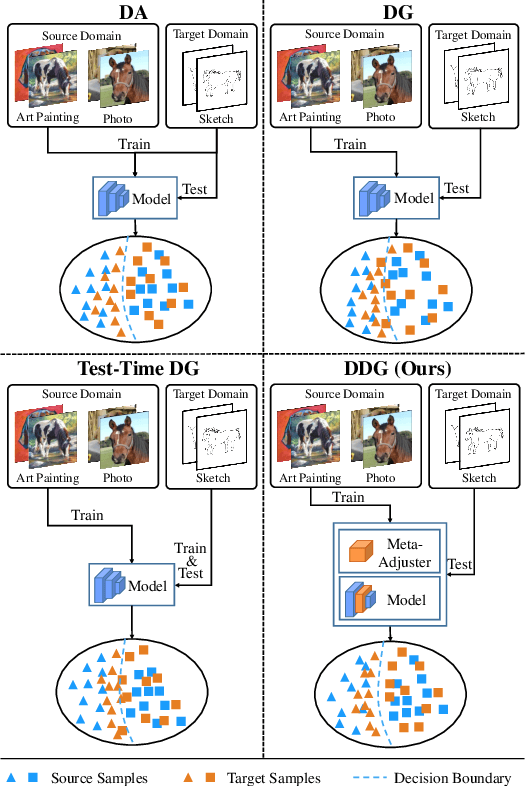
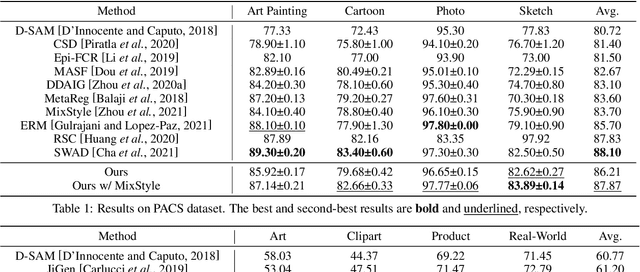

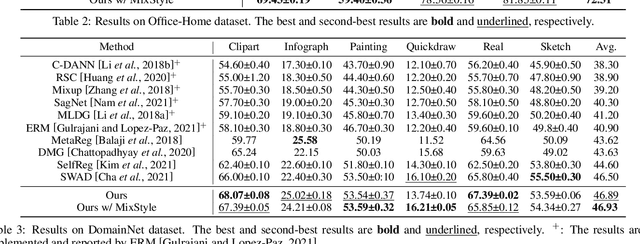
Abstract:Domain generalization (DG) is a fundamental yet very challenging research topic in machine learning. The existing arts mainly focus on learning domain-invariant features with limited source domains in a static model. Unfortunately, there is a lack of training-free mechanism to adjust the model when generalized to the agnostic target domains. To tackle this problem, we develop a brand-new DG variant, namely Dynamic Domain Generalization (DDG), in which the model learns to twist the network parameters to adapt the data from different domains. Specifically, we leverage a meta-adjuster to twist the network parameters based on the static model with respect to different data from different domains. In this way, the static model is optimized to learn domain-shared features, while the meta-adjuster is designed to learn domain-specific features. To enable this process, DomainMix is exploited to simulate data from diverse domains during teaching the meta-adjuster to adapt to the upcoming agnostic target domains. This learning mechanism urges the model to generalize to different agnostic target domains via adjusting the model without training. Extensive experiments demonstrate the effectiveness of our proposed method. Code is available at: https://github.com/MetaVisionLab/DDG
Semi-Supervised Domain Generalization in Real World:New Benchmark and Strong Baseline
Nov 19, 2021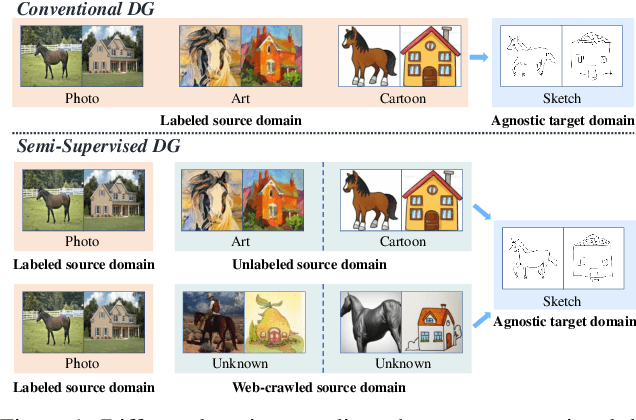

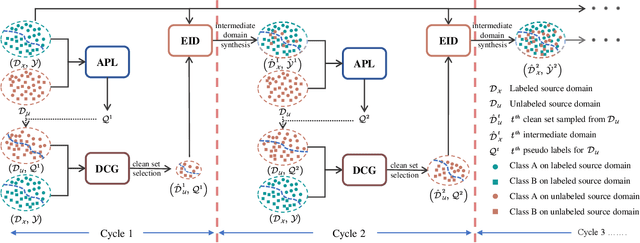

Abstract:Conventional domain generalization aims to learn domain invariant representation from multiple domains, which requires accurate annotations. In realistic application scenarios, however, it is too cumbersome or even infeasible to collect and annotate the large mass of data. Yet, web data provides a free lunch to access a huge amount of unlabeled data with rich style information that can be harnessed to augment domain generalization ability. In this paper, we introduce a novel task, termed as semi-supervised domain generalization, to study how to interact the labeled and unlabeled domains, and establish two benchmarks including a web-crawled dataset, which poses a novel yet realistic challenge to push the limits of existing technologies. To tackle this task, a straightforward solution is to propagate the class information from the labeled to the unlabeled domains via pseudo labeling in conjunction with domain confusion training. Considering narrowing domain gap can improve the quality of pseudo labels and further advance domain invariant feature learning for generalization, we propose a cycle learning framework to encourage the positive feedback between label propagation and domain generalization, in favor of an evolving intermediate domain bridging the labeled and unlabeled domains in a curriculum learning manner. Experiments are conducted to validate the effectiveness of our framework. It is worth highlighting that web-crawled data benefits domain generalization as demonstrated in our results. Our code will be available later.
 Add to Chrome
Add to Chrome Add to Firefox
Add to Firefox Add to Edge
Add to Edge